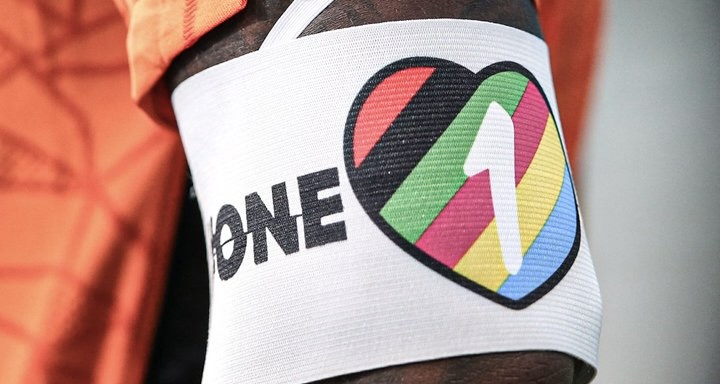Women’s World Cup: Football Australia head ‘optimistic’ rainbow armbands will be worn
Six European teams scrapped plans to wear OneLove bands at the men’s World Cup

The boss of Football Australia is “pretty confident’ rainbow armbands will be permitted at the women’s World Cup this summer.
Chief Executive James Johnson has said a “good dialogue” has taken place with the International Federation of Association Football (FIFA).
Back in March, FIFA said “no decision has been taken in relation to armbands” regarding the women’s World Cup.
But speaking to The Observer on Saturday (13 May), Johnson said the organisation are “not paying lip service” to the issue.
“I do think there’ll be a resolution ahead of the Women’s World Cup” – James Johnson
“We’re in the middle of that process and we’re pretty confident and optimistic that we’ll end up in a good place: a place where players have the ability to express themselves in certain areas, which keeps the players happy, it keeps the host nation happy and also Fifa happy as well.”
“So I do think there’ll be a resolution ahead of the Women’s World Cup,” he said.
Johnson said players from could wear bands representing a variety of different issues, including LGBTQ+ issues and Indigenous rights.
The development comes after several European mens’ squads were warned not to wear the OneLove anti-discrimination armbands during the 2022 Qatar World Cup.
Under FIFA rules team equipment must not have any political, religious or personal slogans, statements or images. The captain of each team “must wear the captain’s armband provided by FIFA”.
FIFA threatened the captains of six different nation due to wear them with potential bookings, including England’s Harry Kane.
In Qatar, it is illegal to be homosexual, and LGBTQ+ people routinely face harassment and abuse. The World Cup was attached to a string of controversies, such as David Beckham being blasted for promoting Qatari tourism.
Johnson added to the publication: “One of the key learnings for us as a host with the Qatar World Cup was seeing how players wanted to use that platform to push issues that were important to them.
“That came through very strongly. And in the case of Qatar, the competition rules were at odds with that desire of the players. So we’re cognisant of that.”
The tournament will be hosted by Australia and New Zealand from 20 July to 20 August.
